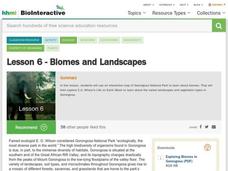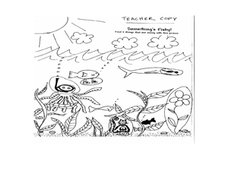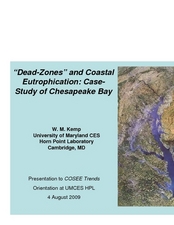Howard Hughes Medical Institute
Lesson 6: Biomes and Landscapes
Aside from the amazing animals in Gorongosa National Park, what else is there to discover? The sixth installment in an eight-part themed series contains an interactive map where scholars can learn more about the geographic features of...
Curated OER
Botanical Garden Field Trip
Young scholars take a field trip to a botanical garden. For this habitat lesson, students walk through the garden and see various species of plants and animals. Young scholars take a canopy walk and see coniferous trees. Students write...
Curated OER
Rainforest
In this biology worksheet, students identify and locate various vocabulary terms that are related to the rain forest. There are 24 biology terms located in the word search.
Curated OER
Rainforest Vocabulary Words: Week 1
In these rainforest vocabulary worksheets, read the definitions and the matching terms for the following rainforest vocabulary terms: decomposers, deforestation, epiphytes, extinct, environment, pollute, vegetation, ecology, climate,...
Curated OER
The Rainforest
Second graders investigate the five different layers of the rainforest. They conduct research to find details pertaining to the animals and the interactions of the existing food chain in each layer of the forest. Students construct a...
Curated OER
The Unknown Secrets of the Rain Forest
Students explore the rain forest and where they are located. Students examine why the rain forests are important and what is happening to them. They investigate the water cycle and life cycle of a frog. Students build a rain forest in...
Curated OER
Effects of Ozone in the Air
Fifth graders, in groups, conduct an experiment in which they measure ground level ozone levels using an ozone measuring kit. They analyze and compare the weather conditions and locations where ozone readings are highest and lowest.
Curated OER
Air Pollution
In this air pollution worksheet, students complete a crossword puzzle by reviewing the different types and sources of air pollution. This worksheet has 13 terms to place into the puzzle.
Curated OER
Climate Change: Is there a Controversy
Students explore climate changes. For this climate changes lesson, students research what causes changes. Students search the Internet, summarize reports they find and create a poster with the information.
Curated OER
My Underwater World
Third graders examine the differences between underwater plant and animal life and human life. They create underwater scenes which display their knowledge of ocean life. They exhibit artwork in the classroom.
Curated OER
Natural Vegetation
In this earth science worksheet, students identify and locate various vocabulary terms related to natural vegetation. There are 21 earth science terms located in the word search.
Curated OER
Autumn
Young scholars examine the cycle of nutrients in a forest. They research the concepts of decomposing and recycling within a forest.
Curated OER
The Formation of Coal
In this coal formation worksheet, students read and informational sheet about coal formation. Students are given 5 short-answer questions regarding what they've read.
Curated OER
Women in Science: Dr. Grace Bush
Learn about the study of paleoecology with a resource about Dr. Grace Bush and her contributions to the field. After reading a one-page passage, learners answer comprehension questions and explore their personal interests in different...
Curated OER
Rainforest Complexity and Diversity
Second graders investigate the diversity of plants and animals in a rainforest. They watch an online story developed by the Rainforest Alliance, observe and record animals in their local area, explore various websites, and compare and...
Curated OER
Living in the Greenhouse
Students discuss the different types of climate zones found throughout the world. They participate in activities which relate to real events. They make observations and the consequences of their actions on the environment.
Curated OER
Crossword: Afternoon on the Amazon
In this literature worksheet, students read 20 clues pertaining to the book Afternoon on the Amazon. Students fit their answers in a crossword puzzle. There is no word bank.
Curated OER
Project-Based Learning and the Arts
What's so great about Project-Based learning? Read to learn how projects can help kids apply higher-order thinking skills, conduct thoughtful investigations, and make cross curricular connections. This short article includes five...
Curated OER
"Dead-Zones" and Coastal Eutrophication: Case-Study of Chesapeake Bay
Take an in-depth look at nutrient loading, eutrophication, and hypoxia using data on The Chesapeake Bay as an example. This comprehensive presentation includes detailed graphs, photos, and details about the changes in marine organism...
Curated OER
Life Cycle of Trees
Turn your students into young tree-tectives with this fun science investigation into the life of trees. To begin, a class volunteer gets dressed up in a tree costume as the different parts of trees are introduced. Then, the class learns...
Calvin Crest Outdoor School
Survival
Equip young campers with important survival knowledge with a set of engaging lessons. Teammates work together to complete three outdoor activities, which include building a shelter, starting a campfire, and finding directions in the...
Curated OER
Hazards: Third Grade Lesson Plans and Activities
Learners discover hazards related to volcanoes and predict the effects these hazards have on people and land. As blossoming geologists explore various volcanic eruptions, including the hazards associated with them, they create their own...
Serendip
The Ecology of Lyme Disease
Areas that previously included no risk of Lyme disease now have cases every year. Scholars learn about the spread of Lyme disease and the relationship with ecological succession. Then, they discuss possible solutions using the known food...
Teacher Created Resources
Problem and Solution: By Jove, I Think You've Got It
Through grand conversation, help scholars identify issues that harm the Earth and find solutions on how to solve them. After voting—on what your class deems the most important problem—stretch writing muscles with a problem-solution essay...

























